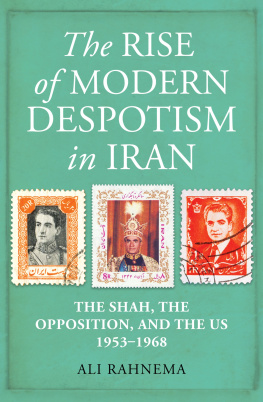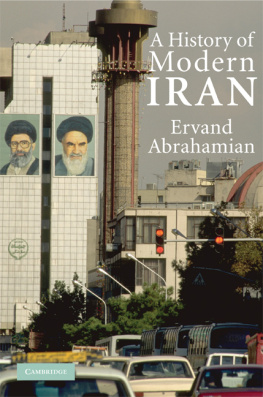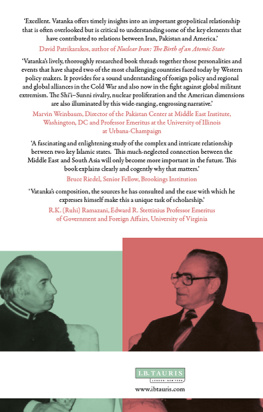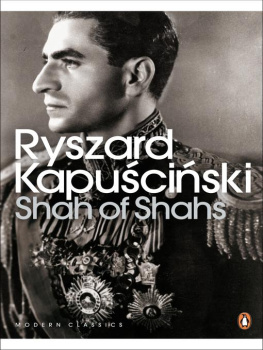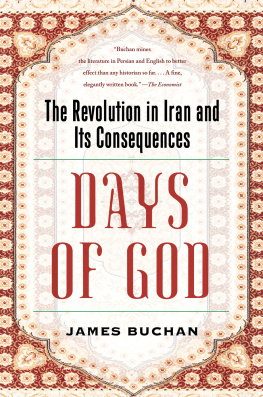Published in 2006 by I.B.Tauris & Co. Ltd
6 Salem Road, London W2 4BU
175 Fifth Avenue, New York, NY 10010
www.ibtauris.com
In the United States of America and Canada distributed by Palgrave Macmillan, a division of St Martins Press, 175 Fifth Avenue, New York, NY 10010
Copyright 2006 Touraj Atabaki
The right of Touraj Atabaki to be identified as the author of this work has been asserted by the author in accordance with the Copyright, Designs and Patents Act 1988.
All rights reserved. Except for brief quotations in a review, this book, or any part thereof, may not be reproduced, stored in or introduced into a retrieval system, or transmitted, in any form or by any means, electronic, mechanical, photocopying, recording or otherwise, without the prior written permission of the publisher.
Library of Modern Middle East Studies 43
ISBN 10: 1 86064 964 5
ISBN 13: 978 1 86064 964 6
A full CIP record for this book is available from the British Library
A full CIP record for this book is available from the Library of Congress
Library of Congress catalog card: available
Typeset in Adobe Garamond Pro by A. & D. Worthington, Newmarket, Suffolk
Contributors
Touraj Atabaki is Professor of Modern History at the University of Amsterdam and senior Research Fellow at the International Institute of Social History. He is the author of Azerbaijan: Ethnicity and the Struggle for Power in Iran (London: I.B.Tauris, 1993), of Beyond Essentialism. Who Writes Whose Past in the Middle East and Central Asia? (Amsterdam: Aksant, 2003), editor of Post-Soviet Central Asia (London: I.B.Tauris, 1998), co-editor, with Erik Jan Zrcher, of Men of Order, Authoritarian Modernisation in Turkey and Iran (London: I.B.Tauris, 2004) and co-editor, with Sanjyot Mehendale, of Central Asia and the Caucasus: Transnationalism and Diaspora (London and New York: Routledge, 2005). An edited volume, The State and the Subaltern: Society and Politics in Turkey and Iran, will be published in 2006. His current work focuses on the historiography of everyday life and comparative subaltern history.
Oliver Bast is Lecturer in Persian and Modern Middle Eastern History at the University of Manchester. He is the author of Les allemands en Perse pendant la premire guerre mondiale daprs les sources diplomatiques franaises (Paris: Peeters, 1997) and editor of La Perse et la Grande Guerre (Tehran/Paris: Institut franais de recherche en Iran/Peeters, 2002). In 2004 he published Putting the record straight: Vosuq al-Dowlehs Foreign Policy in 1918/19 in Touraj Atabaki and Erik Jan Zrcher (eds), Men of Order (London and New York: I.B.Tauris, 2004), pp 26081. His research interests include the diplomatic and political history of late Qajar and Pahlavi Iran as well as questions of historiography and cultural memory in modern Iran.
Martin van Bruinessen is an anthropologist and historian with extensive fieldwork experience in different parts of Kurdistan as well as Indonesia. He holds the ISIM chair for the Comparative Study of Contemporary Muslim Societies at Utrecht University. He is the author of Agha, Shaikh and State: The Social and Political Structures of Kurdistan (London: Zed Books, 1992) and numerous articles on the Kurds and on Indonesian Islam. His present research interests include, besides the political and identity struggles among the Kurds and their neighbours, problems of religious authority among Muslims in Europe.
Stephanie Cronin is Iran Heritage Foundation Fellow in Iranian History, University of Northampton. She is the author of The Army and the Creation of the Pahlavi State in Iran, 19101926 (London: I.B.Tauris, 1997), and editor of The Making of Modern Iran; State and Society under Riza Shah, 19211941 (London and New York: RoutledgeCurzon, 2003) and Reformers and Revolutionaries in Modern Iran: New Perspectives on the Iranian Left (London and New York: RoutledgeCurzon, 2004). Her current work focuses on subaltern responses to modernity in Iran. Tribal Politics in Iran: Rural Conflict and the New State, and an edited collection, Subalterns and Social Protest: History from Below in the Middle East and North Africa, will be published in 2006.
Pezhmann Dailami obtained his Ph.D. from the University of Manchester in 1994. He has published a number of articles on the impact of the Russian Revolution on Iran as well as early Soviet diplomacy in the East. He is at present an independent scholar writing for Encyclopaedia Iranica and working on a manuscript on the Persian Soviet Republic of Gilan (192021).
Mansoureh Ettehadiyyeh obtained her Ph.D. in 1979 from Edinburgh University. She taught history in the Department of History in Tehran University from 1963 to 2000. She is the founder of the publishing house Nashr-e Tarikh-e Iran, which specializes in the history of the Qajar period. She is the author of Peydayesh va Tahavol-e Ahzab-e Siyasi Mashrutiyat (The Origin and Development of Political Parties during the Constitutional Revolution) (Tehran: Nashr-e Tarikh-e Iran, 2002), Majles va Entekahbat az Mashruteh ta Payan-e Qajariyeh (Parliament and Elections from the Constitutional Revolution to the End of the Qajar Period) (Tehran: Nashr-e Tarikh-e Iran, 1996), editor of Reza Qoli Khan Nezam al-Saltaneh, Zendegani Siyasi va Asnad-e Muhajerat (The Life and the Correspondence of Reza Qoli Khan Nezam al-Saltaneh during the First World War), 3 volumes (Tehran: Nashr-e Tarikh-e Iran, 2000), and Inja Tehran Ast, Majmueh-ye Maqalati dar bareh-ye Tehran, 1269HQ/1344 (A Collections of Essays on the Social and Economic Conditions of Tehran, 18501925) (Tehran: Nashr-e Tarikh-e Iran, 1998). Ettehadiyyeh has also written two novels: Zendegi Bayad Kard (We Have to Live) (Tehran: Nashr-e Siyamak, 1997) and Zendegi Khali Nist (Life is not Empty) (Tehran: Nashr-e Siyamak, 1999). She is currently engaged in working on Iranian public opinion from 1870 to 1920.
Homa Katouzian is a social scientist, historian, literary critic and poet. He is Iran Heritage Research Fellow, St Antonys College and Member of the Faculty of Oriental Studies, University of Oxford, an honorary fellow in the Department of Politics, University of Exeter, and editor of Iranian Studies, Journal of the International Society for Iranian Studies. His books in English include Iranian History and Politics, the Dialectic of State and Society (London and New York: RoutledgeCurzon, 2003), Sadeq Hedayat: The Life and Legend of an Iranian Writer (London: I.B.Tauris, 1991), State and Society in Iran: The Eclipse of the Qajars and the Emergence of the Pahlavis (London: I.B.Tauris, 2000), Musaddiq and the Struggle for Power in Iran (London: I.B.Tauris, 1990), The Political Economy of Modern Iran (London and New York: Macmillan and New York University Press, 1981), and Ideology and Method in Economics (London and New York: Macmillan and New York University Press, 1980).


